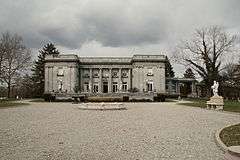Peter G. Thomson House
|
Peter G. Thomson House | |
 | |
| Location | Cincinnati, Ohio |
|---|---|
| Coordinates | 39°11′54.44″N 84°33′16.20″W / 39.1984556°N 84.5545000°WCoordinates: 39°11′54.44″N 84°33′16.20″W / 39.1984556°N 84.5545000°W |
| Architect | James Gamble Rogers [1] |
| Architectural style | Beaux Arts, Renaissance[1] |
| NRHP Reference # | 79001860[1] |
| Added to NRHP | November 29, 1979[1] |
Peter G. Thomson House, commonly known as Laurel Court, is a registered historic building in Cincinnati, Ohio, listed in the National Register on November 29, 1979.
Currently the house is a private residence that is available for tours by reservation for special events.
Design and construction
Peter G. Thomson, founder of The Champion Coated Paper Co., began construction on Laurel Court in 1902. He selected James Gamble Rogers, the nephew of Peter's wife, Laura Gamble Thomson, to design the Gilded Age mansion. Although the design is sometimes mistakenly said to be based on the Petit Trianon, Rogers based the house's ordonnance and design system on the Trianon de Marbre, the Grand Trianon at Versailles, France, as can be seen from the duplication of the Grand Trianon's decorated Ionic order (the Petit Trianon is Corinthian), the governing concept of a colonnade between cubical pavilions, and the overall articulation of the structure. The house is of course smaller than the Grand Trianon, it is revetted in simple stone rather than the varicolored marbles of the French prototype, and it is of two stories rather than one and adapted otherwise to meet the requirements of a private residence of its time, but every design decision in the structure was governed by reference to the Grand Trianon, with no reference whatever to the much later Petit Trianon. The Thomson family moved into the College Hill residence in 1907.[2]
Features
- Atrium with a retractable roof
- Rookwood tile swimming pool
- Turkish carpets[3]
- Library paneled in African rosewood
- Music room decorated in gold leaf[4]
Historic uses
- Single Dwelling
- Secondary Structure
- Residence of the Archbishop of Cincinnati (1947-1977)[3]
References
- 1 2 3 4 National Park Service (2007-06-30). "National Register Information System". National Register of Historic Places. National Park Service.
- ↑ "About Laurel Court". Laurel Court. Retrieved on February 7, 2010.
- 1 2 Gail Deibler Finke (2004). College Hill. pp. 36–39. ISBN 0-7385-3323-8. Retrieved February 7, 2010.
- ↑ Cliff Radel. For sale: One grand landmark. Cincinnati Enquirer. November 5, 1999. Retrieved on February 7, 2010.
External links
- Laurel Court - Official site
- Documentation from the University of Cincinnati